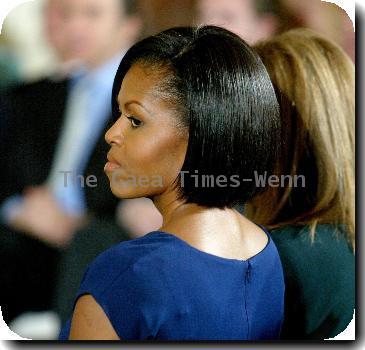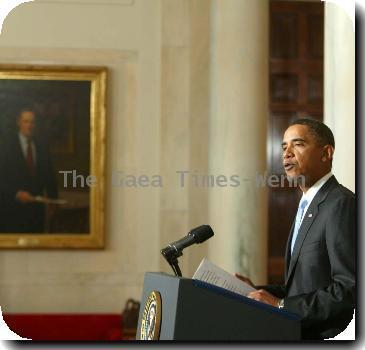Obama focuses on blocking nuclear terrorism as he gathers world leaders for weapons forum
By Steven R. Hurst, APSunday, April 11, 2010
Obama takes non-nuclear pledge to world leaders
WASHINGTON — President Barack Obama’s pledge to one day rid the world of nuclear weapons runs up against global realities this week when representatives from 47 countries try to craft an agreement on keeping nuclear weapons out of terrorist hands.
Sweeping or even bold new strategies were unlikely to emerge from the two-day gathering that begins Monday. But Obama invited the swarm of world leaders as an important step to intensify global focus on one of the most serious nuclear proliferation threats: a world in which non-state actors — like the al-Qaida terrorist organization — obtain nuclear materials.
“The single biggest threat to U.S. security, both short-term, medium-term and long-term, would be the possibility of a terrorist organization obtaining a nuclear weapon. This is something that could change the security landscape in this country and around the world for years to come,” Obama said as he conducted a series of bilateral meetings with world leaders Sunday.
“We know that organizations like al-Qaida are in the process of trying to secure nuclear weapons or other weapons of mass destruction, and would have no compunction at using them,” Obama said.
The president has set a goal of ensuring all nuclear materials worldwide are secured from theft or diversion within four years.
On the table, too, will be Iran’s perceived attempts to build a nuclear weapon in violation of the global Nuclear Nonproliferation Treaty, and North Korea’s nuclear weapons stockpile and exports of nuclear materials and technology.
“We want to get the world’s attention focused where we think it needs to be with these continuing efforts by al-Qaida and others to get just enough nuclear material to cause terrible havoc, destruction and loss of life somewhere in the world,” Secretary of State Hillary Rodham Clinton said in an interview broadcast Sunday on ABC’s “This Week.”
Clinton said the gathering would be the largest assembly of world leaders hosted by an American president since the 1945 San Francisco conference that founded the United Nations.
Obama sought to set the tone in one-on-one meetings Sunday with the leaders of India and Pakistan — antagonistic, nuclear-armed neighbors — as well as South Africa and Kazakhstan, which have given up nuclear weapons programs.
As the meetings ended, White House officials briefed reporters, paying special attention to Obama’s session with Kazakhstan President Nursultan Nazarbayev.
Michael McFaul, Obama’s senior adviser on Russia and the former Soviet Union, said the president praised Nazarbayev as “really one of the model leaders in the world. We could not have this summit without his presence.”
McFaul said Obama noted that Kazakhstan had benefited greatly on giving up its nuclear weapons when the Soviet Union collapsed in the early 1990s. That act led to “greater security and economic prosperity.” Obama said, according to McFaul, that Iran should take a lesson from Nazarbayev.
Obama also spoke about Kazakhstan’s shaky human rights record, a reminder to Nazarbayev that the United States was closely monitoring developments in that field even as it praises the country’s stand on nonproliferation.
As Obama met with South African President Jacob Zuma, Ben Rhodes, a National Security Council spokesman, said the South Africans too had set an example for their continent by giving up nuclear weapons. Rhodes said Obama expressed his belief that giving up such weapons “speaks to the benefits nations can find” in nonproliferation.
Rhodes also announced that Obama would hold a previously unplanned sit-down with the Turkish Prime Minister Recep Tayyip Erdogan. Turkey is a key NATO ally, and relations have been difficult recently, particularly over Iran. Rhodes said there were additional “pressing issues,” including normalization of relations between Turkey and Armenia.
Obama opened Sunday’s meetings with India’s President Manmohan Singh. They covered “the range of issues,” Rhodes said, including food security, poverty reduction, the war in Afghanistan and India’s development assistance to the impoverished nation.
Later, Obama smiled and shared a laugh with Pakistani Prime Minister Yusuf Raza Gilani. As reporters entered the meeting room, Obama was telling Gilani, “we’ve made some progress since then.” It was unclear what Obama was referring to.
Pakistan has a troubled history with the United States, and anti-American sentiment runs extraordinarily high among ordinary Pakistanis. U.S. leaders go out of their way to assure Pakistan that the United States will not walk away from the improving relationship with Pakistan, and Congress has committed billions in new aid to the country.
The United States needs Pakistan’s help as it battles to wipe out the al-Qaida terrorist network’s safe haven in the ungoverned tribal regions along its border with Afghanistan.
Iran and North Korea were not invited because they are viewed as violators of the nonproliferation agreement. Syria was left off the invitation list because the U.S. believes Damascus also has nuclear ambitions.
Israel, meanwhile, said last week that Prime Minister Benjamin Netanyahu would not attend the conference as planned. Insiders said he was worried Turkey and Egypt would use the summit to challenge him over his country’s nuclear arsenal, which the Jewish state never has acknowledged. In Netanyahu’s absence, Israel will be represented by Deputy Prime Minister Dan Meridor.
Obama opens the conference Monday with a working dinner, and meets individually that day with the leaders of Jordan, Malaysia, Armenia and China. The sessions close Tuesday with a joint statement on efforts to prevent the transfer of nuclear materials and technology and to keep them locked up.
The Washington conference is the fourth leg of Obama’s campaign to rid the world of nuclear weapons, which have been used only by the United States to force a Japanese surrender in World War II. The high-flown goal, which the president admits will probably not be reality in his lifetime, began a year ago in Prague when he laid out plans for significant nuclear reductions.
In the meantime, he has approved a new nuclear policy for the United States, vowing last week to reduce America’s nuclear arsenal, refrain from nuclear tests and not use nuclear weapons against countries that do not have them. North Korea and Iran were not included in that pledge because they do not cooperate with other countries on nonproliferation standards.
That was Tuesday, and two days later, on the anniversary of the Prague speech, Obama flew back to Prague where he and Russian President Dmitri Medvedev signed a new START treaty that reduces each side’s deployed nuclear arsenal to 1,550 weapons.
Tags: Asia, Barack Obama, Central Asia, Czech Republic, East Asia, Eastern Europe, Europe, India, International Agreements, Iran, Israel, Kazakhstan, Manmohan Singh, Middle East, National Security, North America, North Korea, Nuclear Weapons, Pakistan, Political Issues, Prague, Russia, South Asia, Terrorism, Turkey, United States, Washington, Weapons Administration, Weapons Of Mass Destruction, Western Europe





